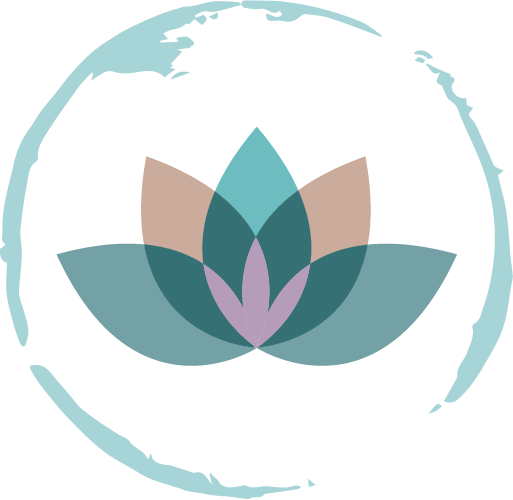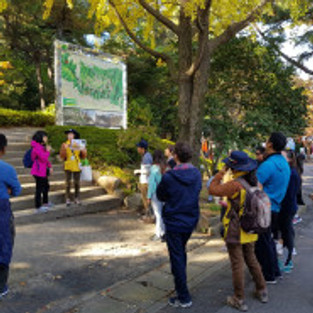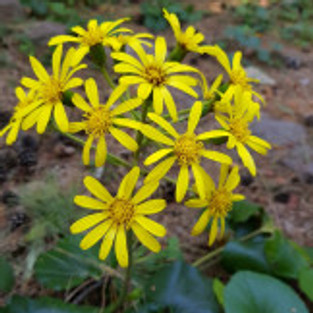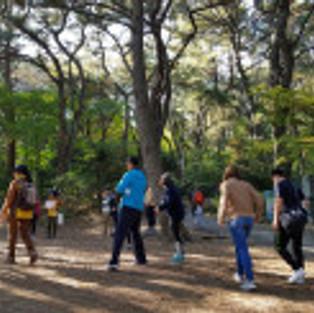Healing and History – A Forest Tour Program in Geumgang Park
- WellMi Wellness Solutions

- Nov 6, 2018
- 4 min read
Busan is a city I’ve called home for the past seven years, but admittedly I’ve spent an embarrassingly small amount of time getting involved with all the events and programs that the city works hard to put together. In light of this, I’ve made an early New Year’s resolution to become a better tourist in the city I call home, and my mission started last Sunday when I attended the Forest Tour Program at Geumgang Park.
Situated at the foot of Geumjeong mountain, Geumgang Park occupies a 3 million square meter wooded area, teaming with wildlife and winding forest trails as well as a badminton court and other outdoor exercise equipment, often referred to as outdoor gyms. It is one of the most visited parks in the city, and enjoys visitors year-round wishing to ride the cable car to the top of the mountain.

This particular forest tour program was created for non-Korean guests, hosted by Dongrae Geumgang Park Organization and sponsored by 산림청 Korea Forest Service. Our point of contact was Jiyoung Sim, a local Korean resident and wellness advocate, who managed the smooth operation and real-time interpretation of the whole tour from start to finish.
The tour group congregated at Oncheon Subway station, around 15 guests all together, before departing for Geumgang Park. The cool breeze on the walk up to the park entrance was a welcome reprieve from the hot afternoon sun. It took around 10 minutes to reach the entrance of Geumgang Park, where we were greeted by our forest guides for the day Ryu Jaseung and Jin Young Hye.

The guides, known as 숲 해설가 or ‘forest ecologists’, were energetic and friendly, and excited to welcome us onto the tour program. The tour started with an ice-breaking warm-up exercise at the park entrance, followed by an in-depth explanation of the charms of Geumgang Park.
Being a forest tour, there were a lot of tree-related anecdotes – much more interesting that it sounds. We learned some fun facts and some more in-depth historical information, and were treated to tales of superstitions and rituals rooted in traditions hundreds of years old.
As a history nerd and wellness tourism researcher, I was really into everything our guide was saying, and there was certainly a lot of information to take in at the beginning of the tour. However, our guides’ delivery was anything but dry, and both were fun and well prepared. I asked forest guide Ryu Jaseung how this forest tour came to be.

“I’m Ryu Jaseung, or so called “mountain bird teacher” because I need to talk a lot like a bird,” she started, “Tweet Tweet’! This program was set up for foreign guests to share the history of Geumgang park and the story of the pine tree.”
I asked about her work, and why she enjoyed it so much. She said it was important to her to share and enjoy nature, and connect with other people.
“It’s a healing program”, she said. “While exploring the woods, we [the certified forest guides] get to know each visitor while talking about the history and trees of Geumgang park. Nature-Loving people [like me] become guides. That’s why I’m here”.

She led us further up the path, deeper into the canopy of not-quite-yet reds and yellows. The smell of the trees reminded me of Scotland in autumn; that fresh, cool air, the smell of pine trees all around, like nature’s answer to aroma therapy. It was relaxing and reinvigorating at the same time, one of the many reasons I love autumn.
As we continued up the trail, we listened and learned as our forest guides did what they do best. Did you know there are no poisonous spiders indigenous to Korea? The more you know…
Our guide led us to a clearing where we took part in some craft activities. Dried gingko nuts awaited, ready to be created into brooches, and charming wooden sticks attached to keychains, which we had to sharpen ourselves and turn into pencils. It was a simple craft, and a lovely addition to what was already a pleasant afternoon.
We walked downhill, past a family of roly-poly mountain dwelling cats. We came to another clearing and played some traditional Korean folk games before heading back uphill to the final part of the tour.

The Geumgang Cable Car takes around 6 minutes from the base to the top of the ropeway, giving riders a sprawling view of Busan from above. Tickets cost 8,000 won round trip for adults and teens, and a one-way ticket will cost you 5,000 won. Senior citizens and children cost 6,000 won and 5,000 won respectively for round trip tickets, and the cable car operates between 9am and 6pm at 20 minute intervals.
I’ve been up the cable car many times before (it’s one of my favorite views of the city) but no matter how many times I’ve seen it, I’m always blown away by the view. The lego buildings, far-off Marine City glinting under the afternoon sun, the cold breeze sliding in through the windows and the evergreens below like a thick, green blanket.
This slideshow requires JavaScript.
After alighting at the top, our group rested at the clearing as other travelers queued up to take the trip back down the mountain. Some of our group went for a bathroom break, some into the local restaurants for a quick bite. We sat at one 맛집 watching the grandmother flip pajeon in a frying pan as if it were an extension of her own arm.
I ordered a bottle of makkoli, sat with some new friends, and cheered to our good health and new connections.
As the time came to leave, we said our thank you’s and headed back down the ropeway, back to where we had met as strangers just a few hours earlier. After saying goodbye, our guides invited us back to join them again next time, and the tour concluded with smiles all round.


Spending time in the the bustling city is a wonderful treat, especially as an expat looking for excitement, but being able to step out of the city and straight into nature is a real privilege. This tour program is an excellent addition to the healing and wellness push going on in Busan, and I’ll be actively on the look out for more programs like this, making sure to take full advantage of everything Busan has to offer now and in the new years to come.
This free forest walking and healing tour program will run until November 30th and start up again in spring 2019.
For more information contact Dongrae Geumgang Park on +82-51-860-7880 or 산림청 Korea Forest Service.
Address155, Ujangchun-ro, Dongnae-gu, Busan 부산광역시 동래구 우장춘로 155 (온천동)Inquiries• 1330 Travel Hotline: +82-2-1330 (Korean, English, Japanese, Chinese) • For more info: +82-51-860-7880Homepagehttp://geumgangpark.bisco.or.kr (Korean only)



















Comments